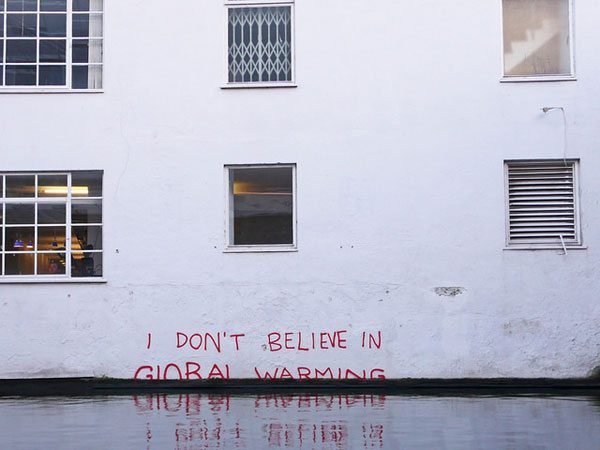
February 6, 2018; New York Times
Raging fires are consuming California, South Africa is nearly out of water, Indonesia is increasingly under water, and Antarctica and the North Pole are melting, but in Idaho, what’s there to worry about? Surely not preparing the state’s children to join the global effort to find solutions to climate change.
Livia Albeck-Ripka, writing for the New York Times, says, “Now, it’s a battle.” Idaho has joined national leaders, the EPA and some other states in a battle over reality. It’s as if the Scopes Monkey Trial were being fought all over again.
And those fighting to keep children from learning about climate change are winning many battles. Albeck-Ripka notes that just yesterday the Idaho House Education Committee approved a revised set of standards. The committee-approved language would allow for some discussion of climate change. “But,” adds Albeck-Ripka, “the committee cut a section on the environmental impact of nonrenewable sources of energy and removed supporting content for standards that contained multiple references to human-driven warming.”
The House committee’s vote is not final, however, as Idaho’s Senate Education Committee will also have to weigh in. Ultimately, standards must be approved by both houses and signed into law by the governor.
The stakes are high, however, as the earth’s vital signs are shaky. Despite the agendas of climate change deniers, the science stressing climate change is sound, and the implications of the data are frightening and require an educated public. Change is occurring more rapidly than predicted by even the most pessimistic objective observers. And we’ve only seen relatively slight changes to the climate to date.
The sound and fury of politicians makes them ill-equipped to imagine or understand fundamental change happening all around them.
The political fight over global warming has extended to science education in recent years as several states have attempted to weaken or block new teaching standards that included information about climate science. But only in Idaho has the state legislature stripped all mentions of human-caused climate change from statewide science guidelines while leaving the rest of the standards intact.
The Idaho House Education Committee’s 12-4 vote yesterday to approve new standards that include only a minor reference to climate change but exclude information about the environmental impact of fossil fuels and human-driven causes of climate change is disturbing. Other breaking news includes EPA leader Scott Pruitt wondering if climate change is not in fact a good thing for the human race:
Sign up for our free newsletters
Subscribe to NPQ's newsletters to have our top stories delivered directly to your inbox.
By signing up, you agree to our privacy policy and terms of use, and to receive messages from NPQ and our partners.
“We know humans have most flourished during times of what, warming trends,” Pruitt said Tuesday during an interview on KSNV, an NBC affiliate in Las Vegas. “So, I think there’s assumptions made that because the climate is warming, that that necessarily is a bad thing. Do we really know what the ideal surface temperature should be in the year 2100, in the year 2018? That’s fairly arrogant for us to think that we know exactly what it should be in 2100.”
Also yesterday, by a party-line vote of 11-10, the US Senate Environment and Public Works Committee approved Andrew Wheeler to be the EPA deputy administrator. Wheeler is a former coal lobbyist who raised money for the senators who just approved his nomination. The White House’s Office of Science and Technology Policy still remains without a nominee, but what does science matter?
As Albeck-Ripka reports, in Idaho the debate over K-12 science standards began in earnest in 2016.
Lawmakers rejected a new set of standards, which were closely modeled after national guidelines developed by a consortium of states and science organizations and included information on climate change, saying more input from the public was needed.
Last year, the House education committee accepted the new standards, but only after scrubbing five sections related to climate change. The passages about climate change were “surgically removed,” said Glenn Branch, deputy director of the National Center for Science Education, which monitors anti-science legislation.
And there has been more back and forth since. Yesterday’s vote by the House Education Committee to once again water down standards effectively repeats the action it took last year—and there are likely to be further twists and turns in the battle ahead. Regardless of state standards, Idaho teachers can still choose to include climate change in their individual lesson plans, but that may be a career decision for some teachers.
Even in Boise, “When you teach environmental science, you’re constantly being discredited,” said Erin Stutzman, a science teacher at Timberline High School in the capital, which, along with other schools nationally, has been mailed anti-science materials from the Heartland Institute, a group that denies the reality of human-induced climate change.
Albeck-Ripka reports that a student leading a petition to include climate change in the state’s science standards testified at a hearing before the Idaho education committee. Before the committee chairwoman cut her off, the student was able to say, “It really puts the students at a disadvantage when the teachers have fear.”
The concerted effort to discredit the scientific consensus over climate change has been ongoing for more than twenty years in the United States and shows no sign of weakening, especially given the stance of the Trump administration. Just as with the twenty-year effort to pass the Paris Agreement, it still is primarily for civil society to defend and implement what the American government perversely rejects.—Jim Schaffer













